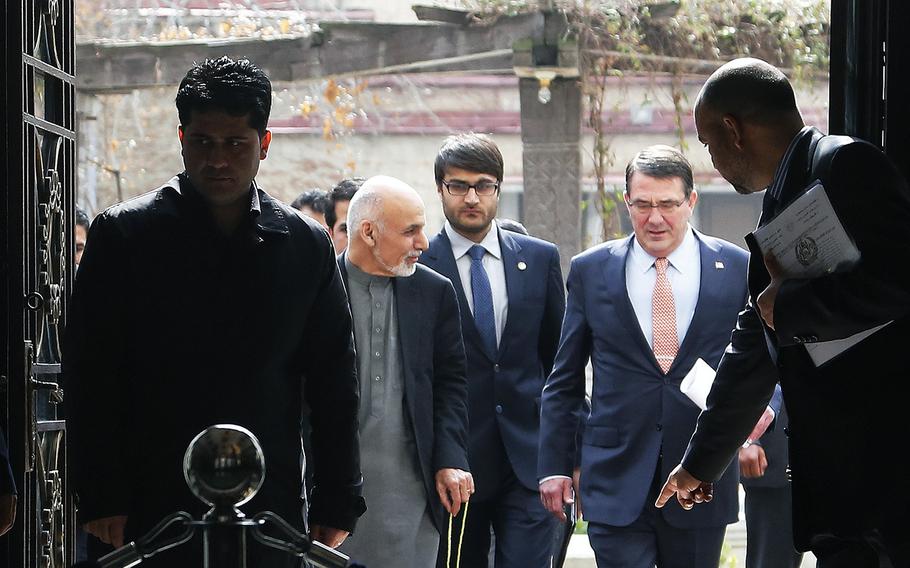
U.S. Defense Secretary Ash Carter and Afghan President Ashraf Ghani arrive at the Presidential Palace in Kabul, Afghanistan, on Saturday, Feb. 21, 2015. (Jonathan Ernst, Pool/AP)
KABUL, Afghanistan — The Obama administration may slow the pace of troop withdrawals from Afghanistan, Secretary of Defense Ashton Carter said Saturday.
In remarks during a joint press conference with Afghan President Ashraf Ghani at the presidential palace in Kabul, Carter said that President Barack Obama is considering “a number of options” to enhance U.S. support to the Afghan National Security Forces.
U.S. troops in Afghanistan are training, advising and assisting the ANSF and carrying out joint counterterrorism operations. But current plans call for the 10,000 troop U.S. force level to be roughly halved by the end of this year. By the end of 2016, the American military footprint in the country would be reduced to an Embassy presence.
Carter said one option under consideration is changing the time line for the troop drawdown. Another would be altering the timing and sequencing of base closures.
The potential moves would be intended “to ensure we have the right array of coalition capabilities to support our Afghan partners” and “the right force protection footprint for our remaining personnel,” he said.
Army Gen. John Campbell, the commander of all U.S. and international forces in Afghanistan, told reporters at his headquarters in Kabul Saturday evening that he has looked at various options but he would not discuss them in detail.
Campbell was asked if the Obama administration and the Afghan government were considering leaving significant numbers of troops in Afghanistan beyond 2016.
“I think in the end that may be part of the review,” he said, but “right now I think we’re comfortable looking at ‘15 and ‘16.”
At the press conference, Ghani said he plans to discuss force levels and other security issues when he meets with Obama next month in Washington.
Although the drawdown may be delayed, Campbell said he doesn’t anticipate an increase in troop levels beyond where they are now.
“I’m not looking for an increase in numbers,” he told reporters. “Would any commander want more? We always want more. But I’m [working] within President Obama’s framework guidance” and “I don’t see the number going up. I see [taking] what we have [now and] making it [work] better.”
He said changing the timing, the glide slope, authorities, and “enablers” are possible ways to better utilize the forces available.
In their meeting Saturday, Carter and Ghani talked about the future of American counterterrorism operations in Afghanistan.
“I think it’s safe to say … counterterrorism will be a continuing preoccupation and commitment of ours here … and we are discussing and rethinking the details of the counterterrorism mission and how the environment has changed here with respect to terrorism since we first laid out our plans,” Carter said.
The Pentagon chief did not specify what changes might be made to the counterterrorism mission. But a senior U.S. defense official, speaking condition of anonymity, told reporters that the counterterrorism mission “is very much going to be a topic of discussion when Ghani comes to D.C., [including] whether or not there needs to be adjustments to the footprint and to the types of CT missions that our guys are conducting.”
The official said it’s possible the size of the U.S. counterterrorism element in Afghanistan might “not get smaller or simply not get smaller as fast” as planned.
One of the main reasons that Obama is willing to reconsider the Afghanistan plans that he laid out last May was the election of Ghani and the exit of former Afghan President Hamid Karzai. Ghani’s predecessor often criticized the U.S. and its international partners and was wary of the foreign troop presence in his country. He also tried limit coalition military activities and placed a ban on nighttime raids.
But Ghani has embraced the military relationship with the United States. Shortly after taking office in September he ended the ban on night raids and signed a bilateral security agreement with the U.S. He also appointed his political rival, Abdullah Abdullah, to a high level position in his government.
“The most important factor influencing our thinking is the change that is represented by the unity of the government of President Ghani and Dr. Abdullah and what that means for the promise of certainty, predictability and progress that just a few months ago we couldn’t have planned on,” Carter said.
Campbell told reporters that the difference between the U.S. military relationship with Karzai and its relationship with Ghani is “night and day.”
The rout of the Iraqi army by members of the Islamic State group after the U.S. withdrew its troops from Iraq has raised concerns in Washington that something similar could happen in Afghanistan if the drawdown proceeds too quickly. People don’t want to see the gains in Afghanistan squandered after so much American blood was spilt.
More than 2,300 servicemembers have died in Afghanistan since 2001, and another 20,000 were wounded.
“Our priority now is to make sure this progress sticks,” Carter said. “Today we remember all of the men and women … who paid the ultimate price to make Afghanistan’s progress possible … We honor them by ensuring that the U.S.-Afghan partnership is… strong and enduring.”
harper.jon@stripes.com Twitter: @JHarperStripes